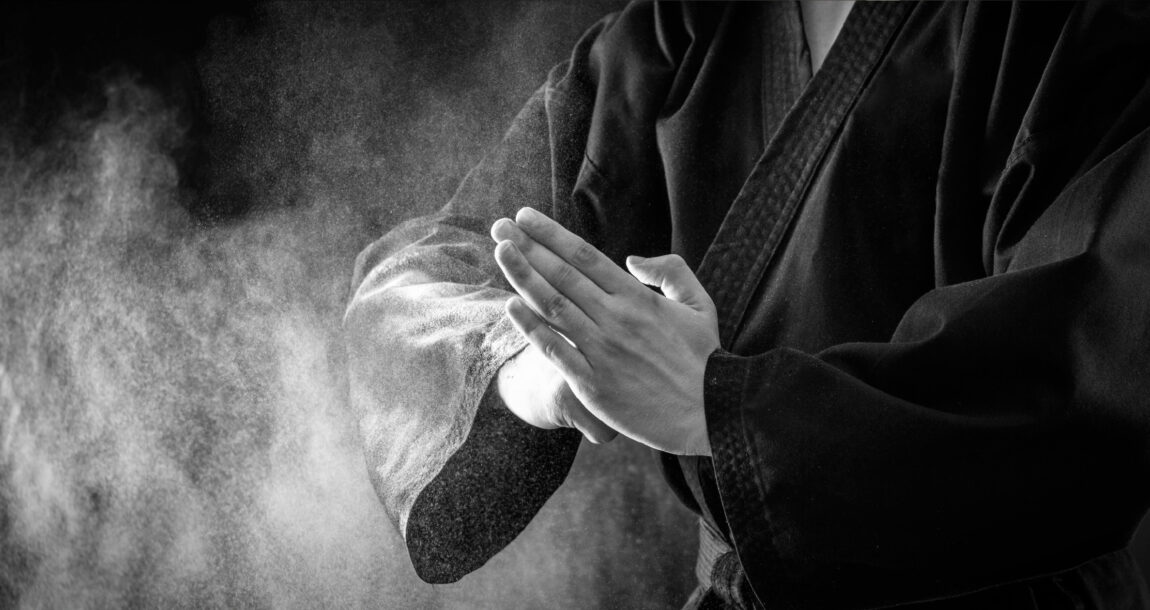Grit: Embracing the daily grind in pursuit of your goals

In spring 1996, I was a young second-degree black belt and college intern for Northwestern Mutual. I was training hard and learning in the classroom and the office about the world of finance and how to build an insurance business.
I also was preparing for a regional martial arts tournament, a competition where the best first through third degrees for 200 miles around came to test themselves and show their skills. Even with a full-time graduate class load and building an insurance business, I was up and training every morning by 5 a.m., plus spending four evenings a week redlining myself to improve as a martial artist.
This was similar to the way I pushed myself as a nascent professional, studying and practicing my language daily and getting in the ring with clients to constantly challenge myself and grow. I had a clear path to my goals.
Six weeks before the tournament, I was sparring with the reigning champion, my friend who would not be defending his title, having been promoted to 4th Dan after winning the previous two years. He was the most naturally talented martial artist I had ever met. We were working on side kick drills when there was a wardrobe malfunction. His side kick that could shatter concrete hit the side of my knee and bent it 90 degrees in a direction that knees don’t go. It took five massive men to hold me down as they realigned my leg into the proper angle.
I would not be fighting in the tournament. I was told I’d probably never fight again.
Maybe you’ve had a loss like this within your business, where everything you slaved for over months and years was taken away in an instant. It could have happened with a keystroke at the home office eliminating your position or because of an unscrupulous employee or a frivolous lawsuit.
Maybe it was from a divorce or the randomness of the universe taking away someone precious to you.
Suddenly, you are lost. You no longer have your purpose; your identity is shattered and you have no hope. Your goal is seemingly gone.
We have all experienced trauma to some extent. Insurance and financial professionals exist in a realm where we constantly lose deals and have setbacks while exposing ourselves emotionally and financially. When the losses hit us, when we are broken or fail, do we lie down and give up?
I didn’t stay down with my knee injury, even if I couldn’t stand up. When a divorce later knocked me down, I got back up. With every failure in the business, I fought back, just like you have, because the key to success in sports or business is “fighting spirit” or, as the psychological literature calls it, “grit.”
Dr. Angela Duckworth is the leading researcher into the science of grit, and her book Grit: The Power of Passion and Perseverance should be near the top of your 2024 reading list for the insights it provides into the psychology of success. The fundamentals of overcoming setbacks along the road to excellence are the same in becoming a martial arts champion as they are for making Million Dollar Round Table for the first time or reaching $100 million of assets under management or being a great parent. They include the ability to lose, learn, adjust, and attempt again and again until the goal is achieved.
The goal is the most important thing. For me, the goal was twofold: making MDRT and becoming a martial arts champion. I tracked my production and activity toward the goal daily, trained every single morning (both in martial arts and in my sales language) , and visualized success in the ring and in the office. There were milestones along the way (such as conducting 25 fact finders a month or fighting nonstop for 45 minutes once a week) and the daily efforts (200 pushups and situps and forms each morning, making two new appointments and receiving five or more referrals regularly). If you are doing the daily things regularly (especially when you don’t feel like picking up the phone or asking for introductions or going to the gym), you will hit most of the interim milestones and consistently move in the direction of your goal.
You must embrace the daily grind to develop the grit to hit your goal. It’s not the great days that make us great. What makes us great is doing what we are supposed to do on the bad days when we want to give up.
Read that again.
Duckworth points out that the two factors that contribute to grit are passion and perseverance. Passion is that overarching purpose: the love of what you do that gets you out of bed as excited as a kid going to an amusement park. The overarching purpose is not your goal, but it is something bigger. It’s not only obtaining $100 million of assets under management but also helping others in financial services. It’s not only winning a title but also becoming the absolute best you can be in your sport.
Passion makes you crack open the book, not because your manager told you to earn a designation but because you are fascinated by special needs planning or charitable lead annuity trusts, and you need to know more. You feel the need to be better at what you do so you can help more people. This is why your friends who are engineers spend their free time building things or playing with machinery, because the greatest professionals in any space have an all-consuming desire to master that thing. It is more than talent, more than curiosity: it is a love of the subject or of that particular game.
Your production goal must be subservient to that bigger passion, that raison d’etre of solving problems or helping people. As Friedrich Nietzsche observed: a person with a strong enough why can overcome any how. Know your why because that is critical to understanding and harnessing the passion of grit. If you are truly passionate about helping others reach their goals, you will have the emotional fuel to do the hard work day in and day out over the weeks and months to hit your goal and live your purpose.
And that consistent effort is the differentiating factor, the persistence.
Anyone can be Superman or Wonder Woman for a day, anyone can write a $50,000 premium case or stumble across a multimillion-dollar rollover. The superpower is to do it every day.
To be excellent, you must be consistent.
To write a $250,000 premium case, you need to be lucky. To write a $100,000 case every week, you need to be focused. Doing all the little things that aren’t sexy — such as prospecting and phoning — are part of the grind. Persistence is doing the same thing over and over, like an athlete repeating their drills or the musician playing scales; these are the things they do that eventually get them to playing sold-out stadiums. Michael Jordan won six titles by focusing on his fundamentals. I do my basic forms every morning. That’s the same thing I did when I rebuilt my knee to start competing after that injury.
There is a well-known adage among champions in all fields: Boring is beautiful. The difference between a professional and an all-star is the ability to repeatedly do the boring basics over and over again until they are perfect and can be done subconsciously. Larry Bird making a 1,000 free throws a day would never make a highlight reel but made him into a Hall of Famer. This is like the advisor in your office who gets a new appointment scheduled every single day and inevitably leads your office in production at the end of the year. Every day, they show up and grind out what they have to do to achieve greatness in daily little inevitable steps.
If Larry Bird lost a game, the next morning he’d make 1,000 free throws. If Larry the Legend scored 40 points in a blowout win, the next morning he’d sink 1,000 free throws. Persistent.
I once lost a six-figure premium case in underwriting but still got my new appointment and five introductions for the day. Then I trained the next morning and got my new appointment and introductions, just like on the days I won a six-figure premium case. Persistent.
Grit is not sexy, but the results are, because champions keep doing what they need to do even when they get knocked down by life (underwriting, bad luck, bad timing, etc.). A bad meeting or a bad day or even a bad month is not enough to make champions quit. Just because you had a bad January and are behind for the year so far doesn’t mean you are done anymore than losing the first round of a fight means the fight is over.
Show up and fight.
What does your activity plan for this year call for you to do to hit your goal? Do what you are supposed to do today. It is that simple. Then do it again. And again. Do it 90 days in a row, and you’ll be on pace for the year again. It may not be easy, but it is just that simple.
If you don’t feel like doing it (whatever “it” is), go back to that vision that gave rise to the goal. Is it still important to you to build that AUM or qualify for MDRT or be a champion or stay sober? Then persist and do what you need to do today.
I’m sorry, but there is no magic word or gee-whiz-bang concept to suddenly make you the biggest producer in your office and let you achieve all your dreams. Economics and psychology show there is only your passion and work. Do the work you need to do today, and have the persistence to do it tomorrow and the day after that, because the work is the way you pursue your passion. That is the essence of grit and becoming a champion.
A year after that injury, 11 months after I was able to start training again and doing the basics over and over and over, I pushed through the pain of rehabilitation and repetition because of the vision and passion. I fought and held up the trophy as champion — not because I was great, but because I had grit.
Joe Templin, MCEC, CEC, CLU, ChFC, CAP, is the author of Every Day Excellence and creator of the Financial Services Daily Drip-Every Day Excellence training email, https://www.salesactivitymanagement.com/everyday-excellence/. He is NAIFA New York State membership chair. He may be contacted at [email protected].





Thrive and grow: 4 ways to protect and grow your business
The man with the $50B plan — With Eugene Mitchell
Advisor News
- Social Security retroactive payments go out to more than 1M
- What you need to know to find success with women investors
- Senator Gary Dahms criticizes Governor Walz's proposed insurance tax increase
- Social Security staff cuts could ‘significantly impact’ beneficiaries
- Building your business with generative AI
More Advisor NewsAnnuity News
Health/Employee Benefits News
- Pear Suite Partners with Health Net and Six Other Health Plans to Launch the Pear Cares Provider Network with 1,000+ Community Health Workers
- Pan-American Life Insurance Group Reports Record Net Income for 2024 On Strong Operating Performance
- GOP lawmakers commit to big spending cuts, putting Medicaid under a spotlight – but trimming the low-income health insurance program would be hard
- Bill aims to limit insurance denials by defining care standards
- Medicaid cuts would hit rural Louisianans especially hard – here's how
More Health/Employee Benefits NewsLife Insurance News